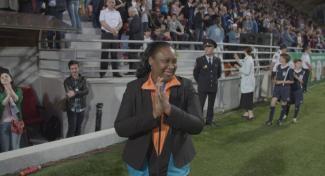Summer Special
The last colony

Of the former British Indian Ocean Territory, precisely one island group remains: the Chagos Archipelago, located in the centre between Asia, Africa and Australia. For decades, London has leased the entire archipelago of 64 islands to the US, which operates a large military base on the main island of Diego Garcia. Yet above all, the tropical paradise is of geopolitical significance to the occupying forces, so much so that they refuse to give it back to Mauritius.
Until the middle of the 1960s, Chagos officially belonged to Mauritius. When the United Kingdom granted Mauritius independence, it retained the remote islands, which had few inhabitants. The UK’s move was illegal, as the International Court of Justice recently confirmed. But while Mauritius, which has fought vehemently for years for the islands to be returned, is the legal owner, the Chagossians would rather be independent.
It is even more important to them, however, that they be allowed to return to their islands. In order to transform Diego Garcia into a military base, now a restricted area, British colonial rulers expelled the entire population of Chagos, around 1,200 people. They and their descendants now live in Mauritius, the Seychelles and above all in England.
From there, they are fighting for their lost homeland, a struggle documented by Belgian director Olivier Magis in the film “Another Paradise”. The film centres on Sabrina Jean, the chairperson of the Chagos Refugees Group UK. She was born in Mauritius in 1973 and lives in Crawley, around 30 kilometres south of London, where there is a large Chagossian community. “I am fighting for my parents’ cause, but especially for my dad,” Jean explains in the film. Her father’s greatest wish is to be buried at his home in Peros Banhos, a small atoll that belongs to the Chagos Archipelago.
The film shows how the uprooted older generation living in exile in England tries to pass on to the young their traditions, language, food, clothing and the songs that tell how the British took everything from them. One gets the sense that this is becoming more difficult from generation to generation, that something has been lost, perhaps irretrievably. The film also depicts the lives of the grandchildren: young people playing football in twenty-first century England, who are far away, in every respect, from the Chagos that the film resurrects in historical footage.
The small diaspora community has high hopes for football. “Another Paradise” takes place in 2016, a few months before the lease with the US runs out, and the Chagossians are betting everything on this lease not being renewed. That’s why they are putting pressure on the British government and protesting in London. There are not many of them, and they don’t have a big lobby. Jean and her fellow campaigners know this. Nevertheless, they have an opportunity to attract more attention: the Chagossian football team – a hobby club in Crawley that Jean heads – has qualified for the 2016 CONIFA World Football Cup.
Participating in the international tournament for stateless people in distant Abkhazia, which was only made possible by a major fundraising campaign, is a high point for the group that the film follows – even when they lose all of their games. In this World Cup of the forgotten, they play against teams from places like Western Armenia, Somaliland or Raetia.
Not shown in the film is the fact that in 2016, the US government’s lease of the Chagos Archipelago was extended for another 20 years. However, that doesn’t mean that the Chagossians’ fight is over. “Another Paradise” makes it clear that they will not give up. They have even proposed acquiring a boat, simply sailing to Chagos and then refusing to leave the islands. It would be a mission with a very uncertain outcome. But Jean gives the impression that she is prepared to do almost anything to achieve her goal.
Film
Another Paradise, 2019, Belgium/France, director: Olivier Magis.
Katja Dombrowski is member of the editorial team of D+C Development and Cooperation / E+Z Entwicklung und Zusammenarbeit.
euz.editor@dandc.eu







